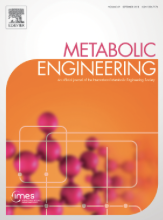| Title | Adaptation to the coupling of glycolysis to toxic methylglyoxal production in tpiA deletion strains of Escherichia coli requires synchronized and counterintuitive genetic changes. |
| Year of Publication | 2018 |
| Authors | D. McCloskey; S. Xu; T.E. Sandberg; E. Brunk; Y. Hefner; R. Szubin; A.M. Feist; B.O. Palsson |
| Journal | PLoS Comput Biol |
| Abstract | Methylglyoxal is a highly toxic metabolite that can be produced in all living organisms. Methylglyoxal was artificially elevated by removal of the tpiA gene from a growth optimized Escherichia coli strain. The initial response to elevated methylglyoxal and its toxicity was characterized, and detoxification mechanisms were studied using adaptive laboratory evolution. We found that: 1) Multi-omics analysis revealed biological consequences of methylglyoxal toxicity, which included attack on macromolecules including DNA and RNA and perturbation of nucleotide levels; 2) Counter-intuitive cross-talk between carbon starvation and inorganic phosphate signalling was revealed in the tpiA deletion strain that required mutations in inorganic phosphate signalling mechanisms to alleviate; and 3) The split flux through lower glycolysis depleted glycolytic intermediates requiring a host of synchronized and coordinated mutations in non-intuitive network locations in order to re-adjust the metabolic flux map to achieve optimal growth. Such mutations included a systematic inactivation of the Phosphotransferase System (PTS) and alterations in cell wall biosynthesis enzyme activity. This study demonstrated that deletion of major metabolic genes followed by ALE was a productive approach to gain novel insight into the systems biology underlying optimal phenotypic states. |
| PubMed ID | PubMed |
